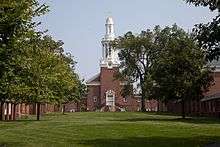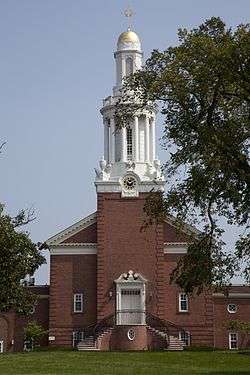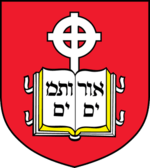Yale Divinity School
| Yale Divinity School | |
|---|---|
|
| |
| Motto | Faith and Intellect: Preparing Leaders for Church and World |
| Established | 1822 |
| Academic affiliation | Yale University |
| Location |
New Haven, Connecticut, U.S. Coordinates: 41°19′24″N 72°55′17″W / 41.32333°N 72.92139°W |
| Dean | Gregory E. Sterling |
| Academic staff | 114 |
| Students | 370[1] |
| Website |
divinity |
Yale Divinity School is the divinity school of Yale University, in New Haven, Connecticut, preparing students for ordained or lay ministry, or for scholarly vocations. The school grants the Master of Divinity (M.DIV.) degree to graduates pursuing ordination, and the Master of Arts in Religion (M.A.R.) and Master of Sacred Theology (S.T.M.) degrees for graduates preparing for academic careers.
Congregationalist theological education was the motivation at the founding of Yale, and the professional school has its roots in a Theological Department established in 1822. The school had maintained its own campus, faculty, and degree program since 1869, and it has become more ecumenical beginning in the mid-19th century. Since the 1970s it has been affiliated with the Episcopal Berkeley Divinity School and has housed the Institute of Sacred Music, which offers separate degree programs.
History
.jpg)
Theological education was the earliest academic purpose of Yale University. When Yale College was founded in 1701, it was as a college of religious training for Congregationalist ministers in Connecticut Colony, designated in its charter as a school "wherein Youth may be instructed in the Arts & Sciences who through the blessing of Almighty God may be fitted for Publick employment both in Church & Civil State." A professorship of divinity was established in 1746. In 1817, the occupant of the divinity chair, Eleazar T. Fitch, supported a student request to endow a theological curriculum, and five years later a separate Yale Theological Seminary[2] was founded by the Yale Corporation.[3] In the same motion, Second Great Awakening theologian Nathaniel William Taylor was appointed to become the first Dwight Professor of Didactic Theology.[4] Taylor was considered the "central figure" in the school's founding, and he was joined in 1826 by Josiah Willard Gibbs, Sr., a scholar of sacred languages and lexicographer Chauncey A. Goodrich in 1839.[4] A dedicated student dormitory, Divinity College, was completed on the college's Old Campus in 1836, but the department had no permanent classrooms or offices until several years after the end of the American Civil War.

After a significant period of enrollment decline, the school began fundraising from alumni for new faculty and facilities.[4] Divinity Hall was constructed on the present-day site of Calhoun College between 1869 and 1871, featuring two classroom wings, a chapel.[4] Around the time of the new campus' construction came the arrival of new faculty, including James M. Hoppin, George Edward Day, George Park Fisher, and Leonard Bacon.[4] The first Bachelor of Divinity (B.D.) was conferred in 1867, and the department became a separate School of Divinity in 1869.[3] The school remained across from Old Campus until 1929, when a new campus was constructed on the northern edge of the university campus, at the top of Prospect Hill.
Berkeley Divinity School affiliated with Yale Divinity School in 1971, and in the same year the university replaced the B.D. with a Master of Divinity program. While Berkeley retains its Episcopal Church connection, its students are admitted by and fully enrolled as members of Yale Divinity School. The Jonathan Edwards Center at Yale University, a division of the Divinity School, maintains a large collection of primary source materials about Jonathan Edwards, a 1720 Yale alumnus. The Yale Institute of Sacred Music (ISM) is jointly-affiliated with the Divinity School and School of Music. It offers programs in choral conducting, organ performance, voice, and church music studies, and in liturgical studies and religion and the arts.
Campus

When the department was organized as a school in 1869, it was moved to a campus across from the northwest corner of the New Haven Green composed of East Divinity Hall (1869), Marquand Chapel (1871), West Divinity Hall (1871), and the Trowbridge Library (1881). The buildings, designed by Richard Morris Hunt, were demolished under the residential college plan and replaced by Calhoun College.[5]
In 1929, the trustees of the estate of lawyer John William Sterling agreed that a portion of his bequest to Yale would be used to build a new campus for the Divinity School.[6] The Sterling Divinity Quadrangle, completed in 1932, is a Georgian-style complex built at the top of Prospect Hill. It was designed by Delano & Aldrich and modeled in part on the University of Virginia.
A $49-million renovation of Sterling Divinity Quadrangle was completed in 2003.
Notable alumni
- Diogenes Allen
- Ian Barbour
- Gregory A. Boyd
- Frederick Buechner
- Will D. Campbell
- William Ragsdale Cannon (Bachelor of Divinity, 1940; Ph.D., 1942), Professor and Dean, Candler School of Theology, Emory University; Bishop of the United Methodist Church
- Donald Eric Capps, (B.D., 1963; S.T.M., 1965), scholar of Pastoral Theology
- Roy Clyde Clark, a Bishop of the United Methodist Church
- William Sloane Coffin
- Chris Coons, United States Senator from Delaware
- Harvey Cox (B.D. 1955), theologian and Hollis Professor of Divinity at Harvard Divinity School (1965–2009)
- Raymond Culver, president of Shimer College[7]
- Michael Curry (bishop), Presiding Bishop of the Episcopal Church (United States)
- John Danforth, former United States Senator from Missouri
- Walter Fauntroy, Founding Member - Congressional Black Caucus
- David F. Ford, Regius Professor of Divinity at the University of Cambridge since 1991[8]
- Paul Vernon Galloway, a Bishop of The Methodist Church
- Leroy Gilbert
- Gary Hart
- Stanley Hauerwas (B.D., 1965)
- Richard B. Hays
- Sen Katayama
- Ernest W. Lefever (1919–2009), foreign affairs expert and founder of the Ethics and Public Policy Center.[9]
- Candida Moss
- Otis Moss III Pastor of Trinity Church, Chicago
- Richard T. Nolan
- Douglas Oldenburg, President Emeritus at Columbia Theological Seminary and the former moderator of the 210th General Assembly of the Presbyterian Church (USA).
- William H. Poteat
- Clark V. Poling
- Peter L. Pond (1933–2000), human rights activist and philanthropist who adopted 16 Cambodian orphans.[10]
- Adam Clayton Powell, Sr.
- George Rupp
- Father V.C. Samuel
- Ron Sider
- John Silber
- John Shelby Spong
- Amos Alonzo Stagg
- Barbara Brown Taylor
- Roy M. Terry
- Krista Tippett
- R. A. Torrey
- John W. Traphagan, professor of Religious Studies and Anthropology, University of Texas at Austin
- Chester Wickwire
- Parker T. Williamson
- William Willimon
Notable professors

- Harold W. Attridge, Dean, 2002–201
Roland Bainton
- Lyman Beecher
- Brevard Childs
- Rebecca Chopp (Dean)
- John J. Collins, 2000–
- Adela Yarbro Collins, 2000–2015
- Jerome Davis
- Margaret Farley
- George Park Fisher
- Hans Wilhelm Frei
- Paul L. Holmer
- Serene Jones
- David Kelsey
- Kenneth Scott Latourette
- George Lindbeck
- Sallie McFague
- Douglas Clyde Macintosh
- Reinhold Niebuhr
- H. Richard Niebuhr
- Henri Nouwen, 1971–1981
- Liston Pope (Dean)
- Letty M. Russell (1974–2001)
- Miroslav Volf
- Henry Burt Wright (1877-1923)
See also
- General Theological Seminary, a separate New Haven institution now located in New York City
References
- ↑ "YDS at a Glance". Yale Divinity School. Retrieved 9 March 2014.
- ↑ History of Higher Education Annual: 1997, p. 94.
- 1 2 A General Catalogue of the Divinity School of Yale College: A Brief Biographical Record of Its Members in The First Half Century of Its Existence as A Distinct Department. New Haven: Tuttle, Morehouse, & Taylor. 1873.
- 1 2 3 4 5 "Yale Divinity School Milestones, 1822-2012". Yale University Library. 23 October 2012. Retrieved 16 November 2015.
- ↑ Yale's Lost Landmarks: Divinity Hall, Yale Alumni Magazine
- ↑ Bedford, Steven (1998). John Russell Popoe: Architect of Empire. New York: Random House. pp. 166–168. ISBN 9780847820863.
- ↑ "Raymond Benjamin Culver". 1937-1938 Obituary Record of Graduates of Yale University (PDF). Yale University. 1938. pp. 137–138.
- ↑ "Faculty Members: Professor David Ford". University of Cambridge. 2011. Retrieved 23 May 2011.
- ↑ Bernstein, Adam. "Ernest W. Lefever dies at 89; founder of conservative public policy organization", Los Angeles Times, July 31, 2009. Accessed August 3, 2009.
- ↑ Mooney, Tom, "Peter Pond's War," Providence Journal, Oct 15, 1989 p. M-06.
